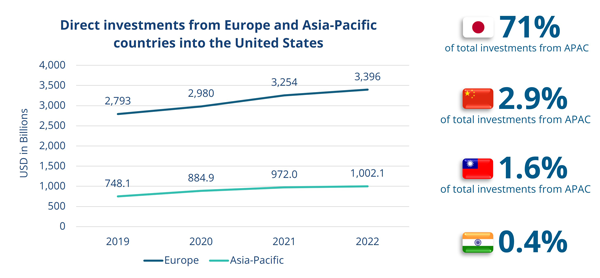The United States continues to be the largest recipient of global foreign direct investment, attracting an estimated $128 billion in 2023. Europe is the largest regional source, accounting for approximately half of the cumulative FDI stock, with Asia Pacific (APAC) countries being the second largest, investing approximately one-fifth of total FDI stock. Companies from Japan, China, Taiwan, and India represent those at the cutting edge of critical supply chains, from semiconductors to electric vehicles and pharmaceuticals, and are the focus of investment attraction for U.S. economic development organizations (EDOs).
APAC executives commonly view the United States as central to their business strategies due to the size of the market and access to innovation, as well as the incentives offered for investments in critical supply chains and the pull that these have on their major customers. The global investment landscape, however, remains competitive, and the United States is just one of many destinations offering attractive packages.
In a time of political and economic uncertainty, shifting supply chains, labor shortages and inefficiencies and inflation, many executives are questioning whether the United States provides the optimal conditions for their future business strategies and are prioritizing other markets over the United States. In our capacity as the FDI representative for multiple American EDOs in China, Japan, Taiwan, and India that aim to attract investment from companies in these countries, Tractus has met with numerous executives to discuss their outbound investment strategies and perceptions of the U.S. investment climate.
Decade of Diversification
Japan is the single largest source of FDI from APAC in the United States. As of 2022, Japanese companies had invested a cumulative $700 billion, accounting for 71% of investments from APAC countries. Yet a 2022 survey of 8,000 Japanese companies conducted by the Japan External Trade Organization (JETRO) found that 47% of Japanese companies are planning on overseas investments in the next one to two years, with the majority focused on emerging markets like India, Brazil, Mexico, and Vietnam. The United States ranked as the 11th most active recipient.
Among Chinese firms, a 2023 survey conducted by the China General Chamber of Commerce – USA (CGCC) reported that 60% of respondents are planning overseas investments, but only 2% of companies are considering investing in the United States, continuing the slowdown that has been ongoing since 2017. Lower cost and friendlier countries across Africa and Asia continue to be the focus of Chinese investments. Taiwanese firms are also prioritizing investments in lower-cost destinations, like the 10-country Association of Southeast Asian Nation (ASEAN) bloc, where investment has surged in the last year. Only 10% of Taiwanese companies are evaluating investments in North America.
Uncertain Headwinds
APAC executives considering investments in the United States are closely monitoring rhetoric from presidential candidates and the shifts in economic policies that could come with a new administration, as well as pending congressional and court decisions in high-profile cases involving foreign businesses.
The 2023 CGCC survey reported that 88% of companies expressed concern with the current state of U.S.-China relations, and 44% of these companies believe that the relationship will deteriorate in the coming year. Decisions involving TikTok and Chinese bio-tech companies such as BGI and WuXi AppTec will have a greater impact on Chinese sentiment than on other APAC investors, but all investors are looking for regulatory certainty during uncertain times.
Japanese companies in particular are heavily focused on the impact a Trump administration could have on infrastructure and environmental policy. The Biden Administration’s policies and incentives were viewed as the topmost factor that had a positive impact on Japanese business in the United States, with 48% of companies surveyed by JETRO echoing this sentiment. If policies change, it could jeopardize the estimated $42 billion that Japanese automakers are predicted to invest in the United States by 2030, as well investments from Japanese funds in renewables, like Itochu’s $2 billion fund.

Labor Shock
Companies across the United States are experiencing labor force challenges in all sectors. The depth and quality of the labor pool, particularly for manufacturing workers, remains a persistent challenge that executives must evaluate in detail to make informed investment decisions and mitigate risks.
You don’t have to go far to find examples of challenges. Through discussions with executives, Tractus learned of the challenges that one Japanese auto-parts manufacturer, Koito Manufacturing Company, faced when evaluating an investment in Indiana. During the analysis, the company determined that the location’s labor shortages presented too much risk to future operations and that the EDOs it was dealing with did not have a credible enough plan to mitigate the risk, ultimately forcing the company to choose another location. This company was not alone, as labor shortages have reportedly impacted 88% of Japanese automotive parts manufacturers.
Inflation’s impact on wage rates has also continued with little signs of abating. APAC companies operating in the United States continue to raise wages to retain employees, and 56% of Japanese firms operating in the United States cited wage inflation as the most persistent challenge to their operations. Nearly half of Chinese firms in the United States also reported that labor was the largest contributor to higher costs, followed by raw materials.
The structure and laws related to unions in the United States are also not well known to many APAC executives. Executives from India, Taiwan, Japan, and China have all expressed frustrations of trying to understand what they consider to be complex state labor laws and their impact on unionization. These challenges are impacting investment decisions, especially when coupled with the rising costs and limited depth of the labor pool. It is not surprising to see that investment is being focused into lower-cost countries, as well as in states with right-to-work laws on the books.
APAC companies will continue to be impacted by global FDI trends during the “Decade of Diversification.” Having the right information to assuage investors’ concerns and strong policies that improve investment attractiveness will ensure that locations have positioned themselves with a competitive investment offering.
